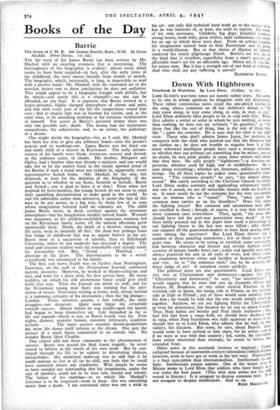Down With Highbrows
Notebook in Wartime. By Lord Elton. (Collins. 7s. 6d.) LORD ELTON'S war-time notes are mostly rather cross. He seems to be one in whom opinions he disagrees with stir displeasure. These rather contentious notes recall the one-idea'd mother in the song, whose comment on all her children's doings is "In step come along, in step come along, in step, in step, in step." Lord Elton definitely likes people to be in step with him. When they admire a writer or artist in whom he sees nothing, or worse than nothing, he does not say urbanely " de gustibus," or " for those that like the sort of thing, that is the sort of thing they like " ; quite the contrary. He is sure that his view is the right view. Those who don't admire James Joyce, for instance, he compares with the child who pointed out that the Emperor had no clothes on ; he does not trouble to enquire how it is that many otherwise intelligent people have such a strange delusion, or whether they can perhaps see something that he misses, just as, no doubt, he sees some quality in some other writers and artists that they miss. He calls people " highbrows "—a tiresome ex- pression, whether used by high, low or middlebrows. He is sure about everything ; whether art, literature, politics or human beings. On all these topics he makes some questionable state- ments. " The common people," he says, " are almost always sound." But surely according to the Christian Church (to which Lord Elton makes constant and applauding references) hardy any one is sound, we are all miserable sinners with no health in us. It must surely be not the common but the very uncommon man or woman who is " sound." Then, " once again the common man carries us on his shoulders." Does this mean the fighting forces? But common and uncommon men alike are enrolled in these ; though, of course, it is true that there are more common ones everywhere. Then, again, " the men who should have led the post-war generation were dead." It has been lately pointed out in this paper how small a percentage of our fighting forces in the last war were killed ; why should one suppose all the generation-leaders to have been among them. none among the survivors? But Lord Elton throws out a number of these puzzling statements ; few of them seem to be quite true. He seems to be trying to establish some connecting link between character and literary and artistic" fashion which scrutiny of history hardly bears out ; noble and ignoble men have always practised the arts in all sorts of ways, and there seems no connexion between virtue and lucidity or between obscurity and vice. As to " the common man," can he be actually the finest judge of art? It somehow seems unlikely. The political dicta are also questionable. Lord Elton sees this war as Christendom and democracy • against the rest. " Christianity and democracy," he says, " are intertwined." I would suggest that he tries that one on Generals Petain and Franco, M. Baudouin, or any other clerical Fascists on the winning side in Spain, the losing side in France, or the national side in Italy or Poland ; any of these would soon untwine them for him ; he would be- told that the two words simply don't go together. Anyhow, we are not fighting Hitler for Christianity. or even for democracy, but because he set out to annex Europe. True, Nazi habits are beastly and Nazi ideals loathsome ; but, had this fact been a casus belli, we should have declared war in 1934, when Nazi beastliness was fully apparent to most of us, though less so to Lord Elton, who admits that he had, on this subject, his illusions. But none, he says, about Russia: these would seem to have arrived to him since, for he writes now as if we were at war with that country ; led, surely, by considera- tions rather emotional than strategic, he seems to favour this extended front.
Other notes in this notebook (written or implied): France collapsed because of nineteenth-century rationalism (which did not, however, seem to have got to work in the last war). Nationalism is a finer conception than internationalism. Intellectuals do not fight. Intellectuals poison nations. One of the wisest men in Britain wrote to Lord Elton that soldiers who have fought in .3. war make the best peace. (This wise man seems not too Wen, versed in history.) It is arrogant to despise common men. It Is not arrogant to despise intellectuals. And so on. Rosa MACAULAY.


























 Previous page
Previous page